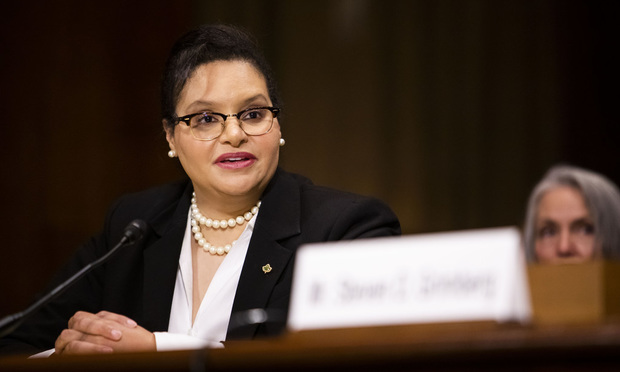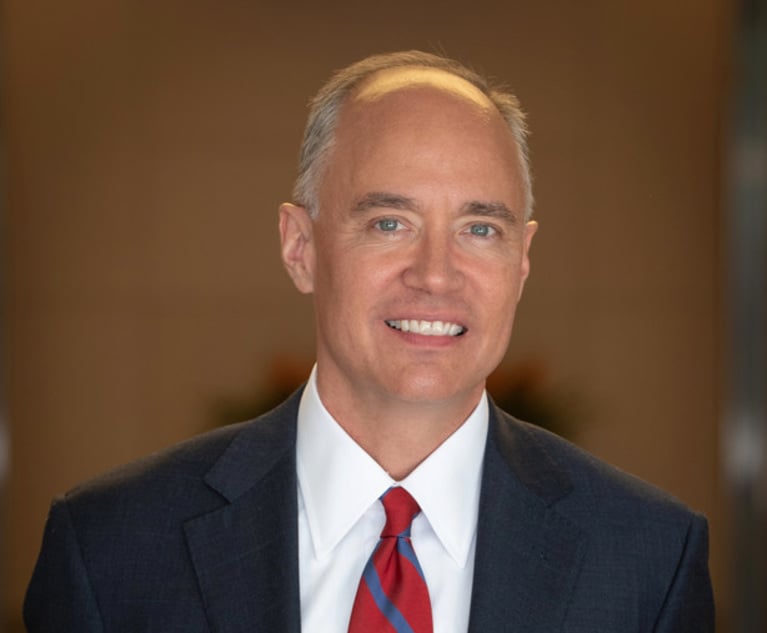Senator Claims Trump's Judicial Picks 'Instructed' to Evade Questions
Texas Justice Ada Brown demurred, along with other federal judicial nominees, when asked about Brown v. Board of Education.
April 30, 2019 at 02:26 PM
5 minute read
The original version of this story was published on Daily Report
 Texas Justice Ada Brown. Photo: Diego M. Radzinschi
Texas Justice Ada Brown. Photo: Diego M. Radzinschi
A U.S. senator has suggested that four federal judicial nominees, including one from Texas, were coached to sidestep his question asking whether the U.S. Supreme Court's landmark decision in Brown v. Board of Education was correctly decided.
Judicial nominees Ada Brown, Steven Grimberg, David Novak and Matthew Solomson all gave nearly identical answers to the question posed by U.S. Sen. Richard Blumenthal, D-Connecticut, during their Senate Judiciary Committee hearing Tuesday.
Blumenthal called the 65-year-old high court decision “one of the pillars of our jurisprudence … that is ingrained in our law.”
Brown is a candidate for the Northern District of Texas, Grimberg is nominated for a seat in the Northern District of Georgia, and Novak is a nominee to the Eastern District of Virginia. Matthew Solomson is nominated to the U.S. Court of Federal Claims in Washington.
Brown, a justice on the Texas Fifth Court of Appeals and an African American woman, told the Senate panel that she benefited personally from the decision, which struck down the concept of “separate but equal” segregation in 1954.
Novak, who told the panel he has Hispanic children, acknowledged they, too, were the beneficiaries of Brown and Blumenthal “could obviously tell what I feel.”
Grimberg called the concept of equality under law “a bedrock of our country,” and Solomson said it was “obviously one of the most important cases” in the Supreme Court pantheon.
But all four nominees claimed giving a thumbs up or thumbs down on whether the Supreme Court correctly decided Brown would violate the federal judiciary's code of conduct. The candidates specifically referenced Canon 3(A)(6), which states in part: “A judge should not make public comment on the merits of a matter pending or impending in any court.” The canon also holds the prohibition of “public comment on the merits does not extend to public statements made in the course of the judge's official duties, to explanations or court procedures, or to scholarly presentations.”
“You obviously have been instructed as to how to answer this question,” Blumenthal said after all four candidates demurred. “There is more than enough latitude under that canon to say, 'Yes, I believe Brown v. Board of Education was correctly decided.' ”
Blumenthal said that, while he welcomed expressions of support for Brown's ultimate intent by the nominees, their collective response “falls short in my view.”
It is not the first time Trump's federal judicial nominees have been challenged by Blumenthal on Brown.
Earlier this month, Wendy Vitter, nominated for a seat on the U.S. District Court for the Eastern District of Louisiana, testified in response to the same question, “I think I can get into a difficult, difficult area when I start commenting on Supreme Court decisions — which are correctly decided and which I may disagree with.”
She later added the ruling, as Supreme Court precedent, is binding and for that reason, “Of course, I would uphold it.”
Neomi Rao, nominated to replace newly minted U.S. Supreme Court Justice Brett Kavanaugh on the U.S. Court of Appeals for the District of Columbia, said at her confirmation hearing it was “not appropriate” to comment, although she acknowledged Brown is “a really important precedent.” Rao was confirmed by the Senate last month and is slated to sit for her first hearing this week.
Last year, Blumenthal repeatedly pressed then-Supreme Court nominee Neil Gorsuch about Brown. Gorsuch twice said Brown was “a correct application of the law of precedent.”
U.S. deputy attorney general nominee Jeffrey Rosen also wouldn't say he specifically supported Brown during his hearing this month. Instead, Rosen suggested answering the question “wouldn't be a productive exercise,” according to The Daily Beast.
On Tuesday, Sen. John Cornyn, R-Texas — a former Texas Supreme Court justice who chaired the hearing — and Sen. John Kennedy, R-Louisiana, followed up on Blumenthal's focus on Brown by posing a somewhat different question to the nominees.
Cornyn asked whether they recognized Brown as “controlling precedent” that they would follow if confirmed. “Faithfully,” said Brown. “Absolutely, it's the rule of law,” Grimberg replied. “Absolutely,” Novak said.
Kennedy then asked each of the candidates to “raise your hand if you believe that racially separate but equal schools are moral in America?” No one raised their hand.
The Louisiana senator then asked, “Can we agree … that racially separate schools are inherently moral and illegal?” The nominees responded with a chorus of “yes.”
But Blumenthal was not assuaged. As Cornyn moved to adjourn the hearing, Blumenthal interrupted to read into the record the judicial ethics canon each nominee cited when declining to answer his question.
“The admonition against public comment about the merits of a pending or impending matter continues until the appellate process is complete,” he said. “I know of no pending or impending matter before any of your courts involving Brown v. Board of Education.”
This content has been archived. It is available through our partners, LexisNexis® and Bloomberg Law.
To view this content, please continue to their sites.
Not a Lexis Subscriber?
Subscribe Now
Not a Bloomberg Law Subscriber?
Subscribe Now
NOT FOR REPRINT
© 2025 ALM Global, LLC, All Rights Reserved. Request academic re-use from www.copyright.com. All other uses, submit a request to [email protected]. For more information visit Asset & Logo Licensing.
You Might Like
View All
Special Counsel Jack Smith Prepares Final Report as Trump Opposes Its Release
4 minute read
Patent Disputes Over SharkNinja, Dyson Products Nearing Resolution

Revisiting the Boundaries Between Proper and Improper Argument: 10 Years Later
8 minute read
'Serious Disruptions'?: Federal Courts Brace for Government Shutdown Threat
3 minute readTrending Stories
Who Got The Work
Michael G. Bongiorno, Andrew Scott Dulberg and Elizabeth E. Driscoll from Wilmer Cutler Pickering Hale and Dorr have stepped in to represent Symbotic Inc., an A.I.-enabled technology platform that focuses on increasing supply chain efficiency, and other defendants in a pending shareholder derivative lawsuit. The case, filed Oct. 2 in Massachusetts District Court by the Brown Law Firm on behalf of Stephen Austen, accuses certain officers and directors of misleading investors in regard to Symbotic's potential for margin growth by failing to disclose that the company was not equipped to timely deploy its systems or manage expenses through project delays. The case, assigned to U.S. District Judge Nathaniel M. Gorton, is 1:24-cv-12522, Austen v. Cohen et al.
Who Got The Work
Edmund Polubinski and Marie Killmond of Davis Polk & Wardwell have entered appearances for data platform software development company MongoDB and other defendants in a pending shareholder derivative lawsuit. The action, filed Oct. 7 in New York Southern District Court by the Brown Law Firm, accuses the company's directors and/or officers of falsely expressing confidence in the company’s restructuring of its sales incentive plan and downplaying the severity of decreases in its upfront commitments. The case is 1:24-cv-07594, Roy v. Ittycheria et al.
Who Got The Work
Amy O. Bruchs and Kurt F. Ellison of Michael Best & Friedrich have entered appearances for Epic Systems Corp. in a pending employment discrimination lawsuit. The suit was filed Sept. 7 in Wisconsin Western District Court by Levine Eisberner LLC and Siri & Glimstad on behalf of a project manager who claims that he was wrongfully terminated after applying for a religious exemption to the defendant's COVID-19 vaccine mandate. The case, assigned to U.S. Magistrate Judge Anita Marie Boor, is 3:24-cv-00630, Secker, Nathan v. Epic Systems Corporation.
Who Got The Work
David X. Sullivan, Thomas J. Finn and Gregory A. Hall from McCarter & English have entered appearances for Sunrun Installation Services in a pending civil rights lawsuit. The complaint was filed Sept. 4 in Connecticut District Court by attorney Robert M. Berke on behalf of former employee George Edward Steins, who was arrested and charged with employing an unregistered home improvement salesperson. The complaint alleges that had Sunrun informed the Connecticut Department of Consumer Protection that the plaintiff's employment had ended in 2017 and that he no longer held Sunrun's home improvement contractor license, he would not have been hit with charges, which were dismissed in May 2024. The case, assigned to U.S. District Judge Jeffrey A. Meyer, is 3:24-cv-01423, Steins v. Sunrun, Inc. et al.
Who Got The Work
Greenberg Traurig shareholder Joshua L. Raskin has entered an appearance for boohoo.com UK Ltd. in a pending patent infringement lawsuit. The suit, filed Sept. 3 in Texas Eastern District Court by Rozier Hardt McDonough on behalf of Alto Dynamics, asserts five patents related to an online shopping platform. The case, assigned to U.S. District Judge Rodney Gilstrap, is 2:24-cv-00719, Alto Dynamics, LLC v. boohoo.com UK Limited.
Featured Firms
Law Offices of Gary Martin Hays & Associates, P.C.
(470) 294-1674
Law Offices of Mark E. Salomone
(857) 444-6468
Smith & Hassler
(713) 739-1250






